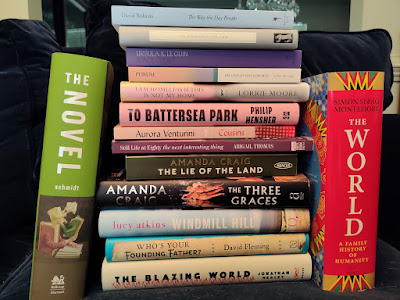It's been almost 24 hours since I realized something irrefutable about the two males I share a home with, something I still believe--after the requisite cooling down period-- is worthy of public broadcast: between the two of them, they don't have the brains that God gave a billy goat. *
You want proof? Your honor, if it pleases the court, Exhibit A: the blister on the bottom of the big toe on my left foot. And Exhibit B: a matching blister on the other big toe. Aren't they lovely? Er, no.
The facts: the two of them, my dearly beloved husband and son, dropped me off on campus yesterday, thereby tacitly agreeing to pick me up when my work day was done. At the time that I always, always, always leave work on a Friday (5 pm sharp), I reported to the usual picking up spot, across from the statue of the 49er panning for gold, and waited.
And waited and waited.
I thought about returning to the library and placing a where-the-heck-are-you phone call (no, I was not outfitted with a cell phone), but since I was sure that the growling stomach on at least one of the two males would momentarily lead him to the realization that logically he could expect no supper if he did not have a cook in the house, and he would remember to make haste to bring me home, I instead decided to walk toward the entrance of campus, during which stroll I would no doubt encounter a family vehicle pulling to the curb with a chastened expression on its driver's face.
The facts are that I left campus and I walked two miles down the edge of a sidewalk-free highway before abandoning the they'll-drive-up-at-any-second-apologizing-like-crazy-for-not-keeping-track-of-the-time expectation for the much more cheerful they've-been-killed- by-a-pack-of-raging -house -cats-and-I-hope-that-Nicholson -barfed-on -them-while-she -was-gnawing-their-knees scenario, which is a much more forgiveable excuse, when you think about it in the right kind of way.
And it rained (Hello, outlier drops from Tropical Storm Hanna!). And then it stopped raining. And I walked the last mile, across countless interstate exit and entrance ramps and an overpass, and I reached our neighborhood and I made a decision: I would walk in our house and not say anything. I'd see how long it would take before someone realized what they'd forgotten to do. And then I'd blast 'em. And send them to bed without supper.
But my husband was sitting outside and he rose to his feet at the sight of me trudging up the driveway and said incredulously, You walked? We were waiting for you to call before we came to pick you up and take you out to dinner.
It turned out that when one of the males that I share a home with was making ready to go pick me up at the appropriate time, the
other male caused him to lose the power of his convictions that I needed to be picked up by telling him that
he was sure I was going to call. Because I had called years ago when I needed to be picked up late at night. And they'd sat around with growling stomachs for an hour waiting for Godot, er, for the phone to ring.
Because obviously, if you don't have the brains that God gave a billy goat,** it would never occur to you to call the library yourself, to put an end to all the speculation as to why
I hadn't yet called, because you think the phone lines run only one way.
One final fact: After dinner at the restaurant, I told the one who'd intended to pick me up sans phone call that he was now old enough to stop falling into line with every one of his dad's notions unless he can provide evidence to support it.
And later this weekend, I intend to offer him this post as an exercise in spotting errors of thought.
Because you have to use the brains you've got.
*another fun saying from my childhood: If they had any brains, they'd take them out and play with them.
**and, when God was handing out brains, they thought he said trains and ran and hid under the front porch; that was fun to say, too.























